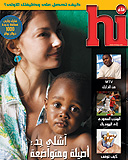It comes as a relief to learn that Karen Hughes, who runs the public diplomacy shop at the U.S. State Department, has suspended the pathetic effort to reach out to Arab and other foreign audiences via a taxpayer-funded magazine named Hi International (best remembered for a notorious June 2005 article, "Sharp-Dressed Men," that told how "real men moisturize").

Hi's November 2005 cover |
|
It's startling to realize that $4.5 million a year produced a mere 55,000 monthly copies of Hi and (according to alexa.com) a website that ranks about 900,000th from the top, suggesting it gets about 100 hits a day. The magazine has been an embarrassment and a waste of money. (When did the war on terror become the war on wrinkles?)
But even had Hi been better conceived and executed, it – and to a lesser degree, such American government efforts as Radio Sawa and Al-Hurra Television – is misconceived. Like generals fighting the last war, diplomats recall the successes of Radio Liberty and Radio Free Europe in providing precious information to Soviet bloc peoples and thereby helping to bring about the demise of the Soviet Union and its satellites. Doing what they know worked once, they largely adopted the same informational model for Hi, Sawa, and Al-Hurra.
But Muslims generally and Islamists specifically do not lack for reliable information; much less do they (as did Soviet-bloc populations) prefer Western sources of information to their own. To the contrary, many indications suggest Muslims favor tuning in or reading reports prepared by their co-religionists, trusting these more than what comes from non-Muslims.
The clearest proof comes from Muslims living in Western countries (including Israel) who are fluent in one or more Western languages. Enjoying access to a huge array of television stations and Internet sites, they generally get their news not from these but from Muslim sources.
One sign of this pattern is the intense effort by such television stations as Al-Jazeera (in Canada) or Al-Manar (in France) to reach Muslim audiences; or Al-Jazeera's plan to begin broadcasting in English in early 2006. An even more compelling piece of evidence comes from Islamist terrorists living in the West, who practically block out non-Muslim sources of information.
For example, consider the background to the March 1, 1994, assault by a Lebanese immigrant, Rashid Baz, against a Jewish boy, Ari Halberstam, on the Brooklyn Bridge in New York. As Uriel Heilman recounts in the Middle East Quarterly, Baz shot and murdered Halberstam four days after an Israeli, Baruch Goldstein, killed 29 Muslims in a mosque in Hebron. The Goldstein massacre prompted riots throughout the Middle East and incensed Muslims in the United States, who "interpreted the events unfolding in the Middle East very differently from most of America."
Although the Israeli government unstintingly condemned Goldstein's act, the Arabic press "almost without exception" portrayed the massacre as a responsibility of the Israeli people and government. It broadcast the Palestinian representative telling the United Nations that "the government of Israel is accountable for what has taken place . . . and one can say it even participated in the act." Islamist sources declared that "anybody or anything remotely linked with Israel" was a legitimate target for revenge.
Baz lived and breathed this interpretation: American broadcasts and newspapers were irrelevant to him. Although he lived in the world press capital, he inhabited a mental environment shaped by near and distant Arabic-language editors. With an anger "fueled by reports from Arabic sources that painted the killer Goldstein as an agent of Israeli will, rather than as a deranged gunman acting alone," he equipped himself with a small arsenal of weapons, searched out a target related to Israel, found it in a van full of Hasidic boys, and embarked on his murderous rampage.
Unlike the Soviet bloc, the Muslim world lacks not access to reliable information but interest in it. The reasons are many but perhaps the most salient of them are a disposition to believe in conspiracy theories and an attraction to totalitarian solutions. Rather than try to purvey information to Muslims, State (and its counterparts elsewhere) should instead assert the case for liberal, secular, and humane values. More than facts, the Muslim world needs to understand the basics of what makes the West thrive – and thereby be inspired to emulate it.
_________
Dec. 27, 2005 update: For several points that could not fit here, see "Additional Thoughts on 'Winning the Propaganda War'."
_________
